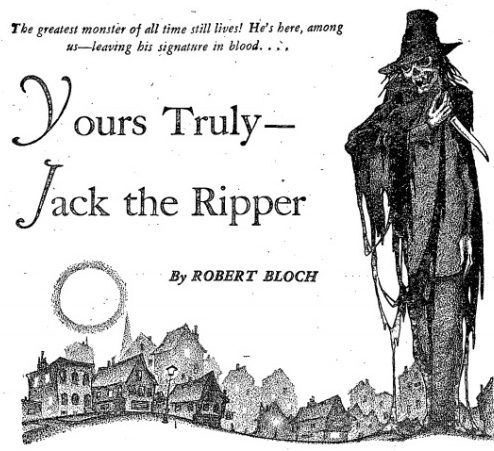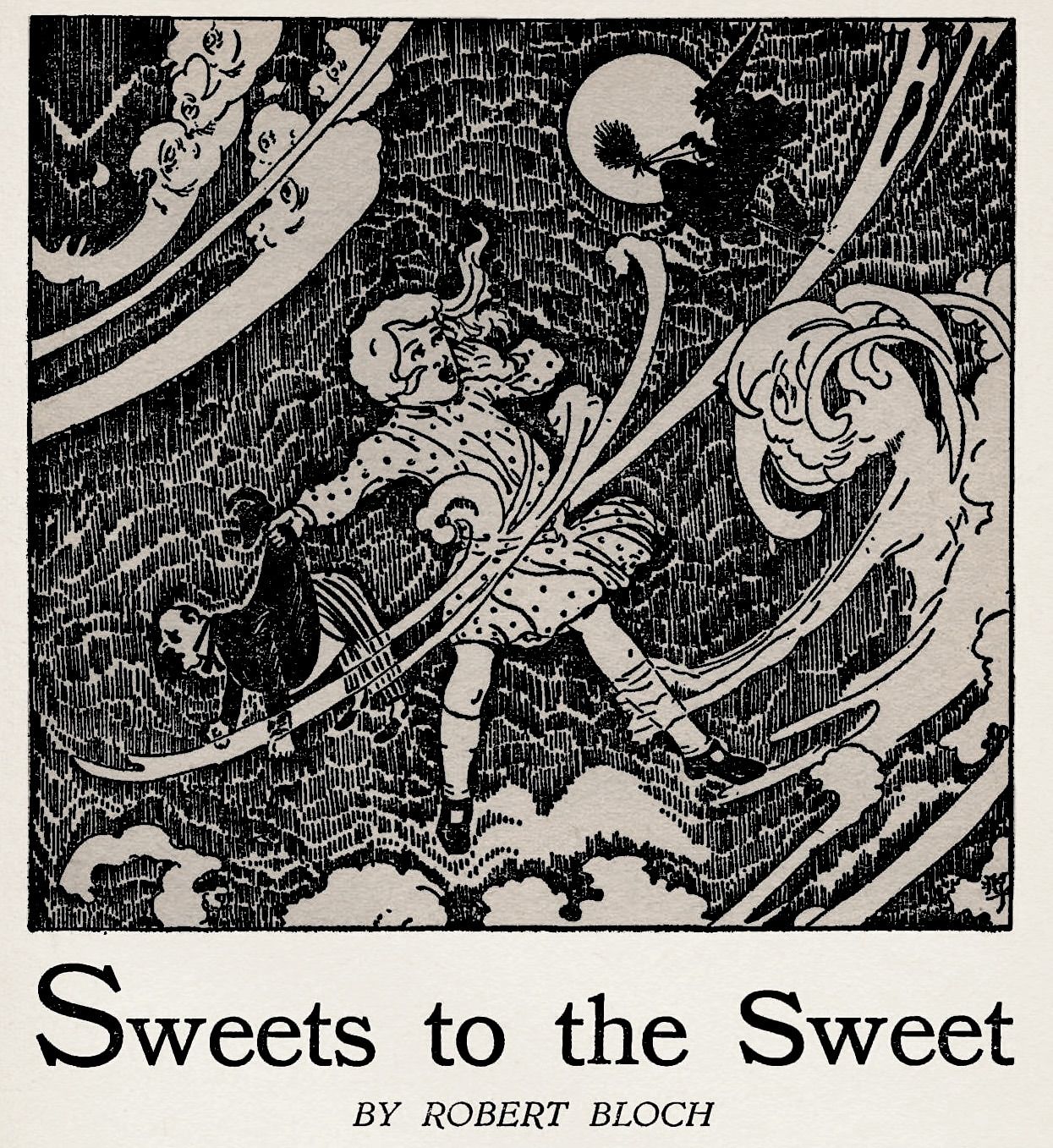Robert Bloch wrote literature that ranged from the psychologically terrifying to the downright “weird” horror; his inspiration stemmed both from watching his first scary film on his own as a child—and his subsequent nightmares—and his admiration for the stylistic horror of H.P. Lovecraft. His stories, however, are and always will be uniquely Robert Bloch, a genius in psychological horror with a splash of the supernatural. His deep interest in serial killers brought back anti-heroes like Norman Bates and Jack the Ripper.
“The Shambler From The Stars” (1935)
This particular short story first appeared in the September issue of Weird Tales, in 1935—later on, it was included as a part of his first published book, The Opener of the Way (1945). It was one of the many works that bore the influence of H.P. Lovecraft and can be considered part of the genre of cosmic horror. More than just another author following the footsteps of Lovecraft, Bloch still included elements of Lovecraftian influence, such as the inclusion of The Necronomicon, and The Book of Eibon. Deliciously self-indulgent, Bloch’s story is about a writer of weird fiction obsessed with learning all things occult when he looks to find the aforementioned esoteric tomes of forbidden knowledge. As we all know when it comes to Eldritch cosmic horror, this writer inevitably summons something disastrous.
“The Secret in the Tomb” (1935)
Another instance of cosmic horror in the early days of Bloch’s writing career, it has been compared directly to the stylistic literature of the father of cosmic horror himself—to the point that, if the author of this had been unknown, it would have been assumed to have been a product of Lovecraft. This dark, dank tale of eldritch horror and dread is lurking, just beyond sight, and awaiting the arrival of the last descendant of a long line of sorcerers.
“The Mannikin” (1937)
Another Weird Tales original, published in the April edition in 1937, we get a tale of a strange reclusive and a disfigured, hunchbacked man named Simon, whom the locals all despise. As a short story, of course, it doesn’t take long to find that this cosmic horror is based all around the diabolical hump on Simon’s back—just wait until you find out what the hump really is.
“The Sorcerer’s Jewel” (1939)
This is a story that Bloch originally published under the pen name Tarleton Fiske in Strange Stories Magazine, in 1939; in this story we see a similarity to “A Shambler in the Stars” when we follow a photographer who takes incredibly bizarre photos as his life’s passion. While he doesn’t believe in the occult, his assistant happens to be a devotee of a peculiar occult practice and everything changes when the photographer is brought an ancient jewel.

“Yours Truly, Jack The Ripper” (1943)
Over the years, Robert Bloch’s short story “Yours Truly, Jack The Ripper” has been adapted to various mediums following its publication—the story is about a man from Chicago who is approached by a gentleman from England who tells him that he’s looking for Jack the Ripper. This, of course, is strange on its own as the infamous serial killer should have died years before. The Englishman believes that Jack the Ripper has become immortal through occult means and that his serial murders are actually ritual sacrifices that restore his youth. The man from Chicago is enlisted to help to bring the Ripper to light.
“Satan’s Phonograph” (1946)
A slow burn for a short story, this haunting tale follows the narrator down memory lane as he tells the reader about the ingenious, but wildly mad piano teacher that helped him to reach Carnegie Hall—but when the pupil returns from his tours across Europe with his new wife in tow, he finds that his old teacher had been institutionalized—when his insane old teacher shows up in his house with a seemingly innocent phonograph and his wild theories, the narrator believes his teacher is simply delusional.

“Sweets To The Sweet” (1947)
Bloch spins the thread of a sinister six-year-old girl, following the narrative of the housekeeper as she speaks to her former boss’s brother, who happens to be a lawyer. The housekeeper encourages the lawyer to look into what she believes to be a brutally abusive situation between father and daughter. She tells the brother about all of the signs of alcoholism and beatings, while the child is accused of witchcraft. When the lawyer finally goes to investigate what is happening in his brother’s home, he finds out that the truth may be more disturbing than he expects.
“Floral Tribute” (1949)
An eerie tale of a young boy being raised by his grandmother brings her fresh flowers home every day—it’s not until the inhabitants of the local cemetery come to speak with the grandmother that she finds out that he has been taking them from the graves of the nearby graveyard, where he plays among the tombstones.
“The Shadow From The Steeple” (1950)
Yet another story based in the Lovecraft universe, Bloch starts the story off with the friend of a character Lovecraft had killed in his short story “The Haunter in the Dark” whom Lovecraft had modeled after Bloch himself. A convoluted and dark fictional tale based on Lovecraft and his circle of writers, we get to see the authors appearing as characters of their own making. As another story within the Cthulhu Mythos, we see how involved Bloch was still within the Lovefcraft style even at this point in his career.
“Head Man” (1950)
An interesting spin on Nazi Germany’s obsession with the occult and paranormal, a SS executioner puts everything on the line to keep possession of the heads of a man and woman who had been charged with witchcraft and executed as a result.
“The Hungry House” (1951)
A tale that will once again make you fear your own reflection in a mirror; “The Hungry House” takes place after a couple moves into their new home. As they try to get comfortable in their new house they begin to see spooky inexplicable reflections around the house and dismiss it as being an overactive imagination. It’s not until the husband finds the locked closet in the attic that they realize something is incredibly wrong with their house—in it are all of the mirrors that the previous owners had removed from the walls of the house.
“Notebook Found in an Abandoned House” (1951)
This story is told from a notebook found in an abandoned house, which was written by a twelve-year-old boy by the name of Willy Osborne who is trapped within the house by the sinister beasts, or “them ones,” that stalk him from within the woods and swamps that surround the house. “Them ones,” that Willy is scared might come and get him are monstrous, Lovecraftian elder creatures who used to be take sacrifices to be appeased.
“The Light-House” (1953)
This particular short story took special influence from a story that Edgar Allan Poe began before his death in 1849, but was never able to finish; in 1953 Bloch took this unfinished short story, finished it, polished it up, and then had it published. As such, it is considered a posthumous collaboration. It follows the pursuits of a nobleman who takes a job as a lighthouse keeper, so he may write in solitude. His loneliness gets the better of him in this weird and satisfyingly dark tale, when he tries to psychically summon a companion.
“House of the Hatchet” (1955)
A couple with a relationship on the rocks decides to take their a second honeymoon on the road—on their trip they end up stopping at a haunted tourist attraction, where the story goes that a husband had killed his wife with a hatchet in one of the rooms. When they decided to take a tour of this haunted house, the husband begins to feel a heavy dark presence in the room where the murder was said to have occurred…
“Terror In Cut Throat Cove” (1958)
Considered a horror adventure tale, “Terror In Cut Throat Cove” follows the tale of an American writer who is approached by a treasure-hunting duo; they end up recruiting him to help them locate this long-lost legendary ship that sunk with a massive fortune aboard because the writer has an undeniable fondness for the girlfriend of the treasure hunter. A crazy adventure ensues until they find the ship and one of the divers returns from the ship’s wreckage without his head.
“The Animal Fair” (1971)
This story of a drifter who ends up in the small town of Medley, Oklahoma while the carnival is in town—where he enters the a tent that houses a gorilla who happens to be the main attraction—not to mention seriously abused by his trainer. This horrifying weird tale ends in a shocking twist and is well worth the read.
Works Cited:
Cowan, Matt. “FIFTEEN HORROR TALES BY ROBERT BLOCH.” Horror Delve, 4 Apr. 2016, horrordelve.com/2016/04/04/robert-bloch/.
HorrorBabble. “The Shambler from the Stars” by Robert Bloch. Youtube/”The Shambler from the Stars” by Robert Bloch, HorrorBabble, 12 Mar. 2018, youtu.be/0Q6xA0f9SNk.
HorrorBabble. “The Secret in the Tomb” by Robert Bloch. Youtube/”The Secret in the Tomb” by Robert Bloch, HorrorBabble, 20 Aug. 2018, youtu.be/vodqchPxgCoyoutu.be/vodqchPxgCo.
Thomas, G. W. “The Early Robert Bloch.” Dark Worlds Quarterly, 6 Aug. 2020, darkworldsquarterly.gwthomas.org/the-early-robert-bloch/.

Georgia-based author and artist, Mary has been a horror aficionado since the mid-2000s. Originally a hobby artist and writer, she found her niche in the horror industry in late 2019 and hasn’t looked back since. Mary’s evolution into a horror expert allowed her to express herself truly for the first time in her life. Now, she prides herself on indulging in the stuff of nightmares.
Mary also moonlights as a content creator across multiple social media platforms—breaking down horror tropes on YouTube, as well as playing horror games and broadcasting live digital art sessions on Twitch.
